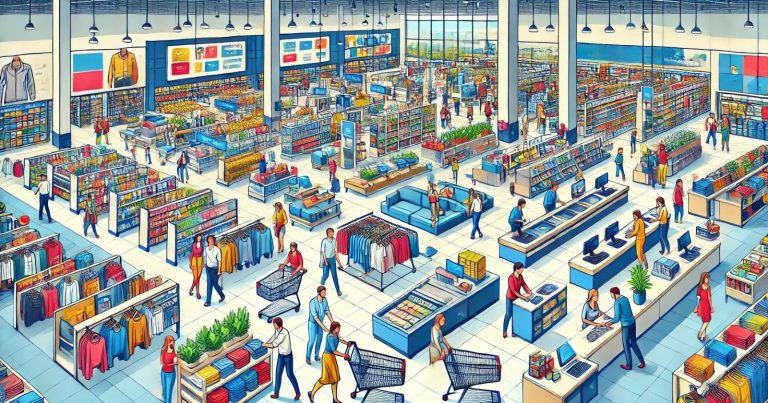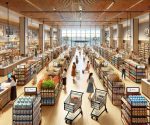The disadvantages of departmental stores include higher working costs, management hassles concerning large inventories, and extreme competition from online and local vendors. Although providing a one-stop shopping experience for various products, a departmental store has issues such as higher commodity prices and maintenance. High overhead costs, more expensive maintenance, and lesser loyalty are some challenges departmental stores encounter. Most departmental stores in India suffer due to increasing e-commerce dominance and shifts in shopping habits. Thus, understanding the benefits and drawbacks of departmental stores will benefit businesses and customers.
What is Departmental Store?
A departmental store is a large-scale retail outlet providing various products in various sections or departments. The different departments of a departmental store specialise in specific product categories, such as clothing, cosmetics, home appliances, groceries, and electronics. The main goal of a departmental store is to give the customer a one-stop shopping experience. Popular examples in India are Shoppers Stop, Big Bazaar, and Lifestyle.
Features of Departmental Store
The features of a departmental store distinguish it from other retail businesses. The store provides a premium shopping experience to satisfy customers and simplify their jobs.
Wide Variety of Products
Departmental stores sell various goods, such as clothing, food, home appliances, cosmetics, and electronics. Each section within the store caters to specific types of goods, so shoppers can quickly look for what they want in just one place.
Centralized Location
Most departmental stores are in major city centres or developed shopping malls. This attracts many customers while keeping life handy for people living around or passing by the area.
Large-Scale Operations
Departmental stores are operated on a large scale and require huge investments. They have various sections and trained staff for good service. The stores have efficient management for handling many customers daily.
Modern Infrastructure and Facilities
They are offering air-conditioned spaces, escalators, elevators, and parking facilities. They focus on providing customers with a comfortable shopping experience so they can have a good time while shopping.
Customer-Focused Services
Departmental stores offer home delivery, gift wrapping, product exchange, and instalment payments. Many others provide loyalty card programs and special discounts, especially for their daily customers.
Fixed Pricing and Billing System
Departmental stores have a fixed pricing system, whereas small shops do not. Automated billing also provides complete transparency while helping the customer quickly clear his bills.
Self-Service Model
Many departmental shops allow customers to browse the shops independently using self-service. The help of sales guys is only accessed when necessary while shopping.
Strong Brand Presence
Most department stores are part of large retail chains, and they ensure the quality and trust of the brand. They attract more customers because of their good branding and marketing strategies.
Large Storage and Inventory Management
Such stores have a big warehouse; these are stocked and ready. Modern retail management systems assist in tracking stock and sales, hence smooth working and better satisfaction from the customer’s side.
Advantages of Departmental Store
Departmental stores have a wide array of products within the same roofing, making the shopping experience convenient and hassle-free. They adopt the latest infrastructural and managerial tools to satisfy the customer’s needs conveniently.
All Facilities in One Place
Departmental stores have everything under one roof, thus saving time and effort for customers. A shopper can buy clothing, groceries, electronics, and household items all in one visit. These stores also provide trial rooms, billing counters, and customer service desks, making shopping easy and stress-free. The customer does not need to visit several shops that improve their experience.
Better Customer Experience
Modern departmental stores focus on the customer’s comfort by offering spacious layouts, air-conditioning, and parking facilities. This makes shopping less tiring and more enjoyable. Wide aisles and proper organization help customers to find their required products easily. Many stores offer seating areas and food courts so shoppers can relax and enjoy their time.
High-Quality Products
Most departmental stores sell branded and quality-checked products, making them more reliable than local markets. The authenticity and durability of items bought can be trusted. In contrast with small shops, these stores get their supplies directly from manufacturers, ensuring the quality standards are met and products are covered with a warranty or guarantee.
Competitive Pricing and Offers
These stores attract customers by offering discounts, promotional sales, and loyalty programs. Many offer seasonal discounts, festive sales, and combo offers that make shopping more affordable. Unlike traditional markets, these stores update their pricing strategies regularly to remain competitive. Membership discounts and reward points also benefit the customer.
Centralised Management
Advanced billing, inventory, and customer service systems help the departmental stores increase efficiency. Automated billing counters reduce waiting time, while the inventory system ensures that products are always available. The customer service desks quickly handle complaints and queries, ensuring a smooth shopping experience. Fast and reliable service is offered to all shoppers due to well-organized management.
Disadvantages of Departmental Store
Although it is convenient for consumers, departmental stores have many problems. The chief problems are high operational costs, competition, and lack of personalisation.
High Operating Costs
A high investment is needed to maintain a modern infrastructure with spacious layouts and employee salaries. Such departmental stores must have advanced security, air conditioners, and multiple billing counters, which means higher operational costs. High rentals in prime locations also add up to the expense. In such cases, they have to increase the price, which makes products unaffordable for budget customers.
Expensive Products
The fixed pricing structure in departmental stores might cost their products relatively higher compared to small retail shops or local markets. Also, as the offers from the departmental stores do not go by negotiation and sometimes may be fixed at the display, there will hardly be chances of talks that reduce footfall at wholesale markets, street shops, and even online stores.
Competition with Online Shopping
Online shopping creates tough competition in departmental stores. People avoid shopping malls because discounts, home delivery, and the ease of returns are available from online platforms. Online shops can be accessed and operated 24/7 by busy customers without having time to travel to physical shops. Many today compare home prices before purchasing, indirectly reducing sales for departmental stores.
Limited Personalization
Unlike small retail shops, where shopkeepers build personal customer relationships, departmental stores lack personalisation. The employees in big stores serve thousands of customers daily; thus, offering individual attention to them becomes impossible. This makes customers feel less valued, especially when they need product recommendations or special assistance. This can cause a decrease in customer loyalty.
Overcrowding During Sales
Departmental stores, during festival sales, discounts, or clearance offers, attract large crowds. It becomes more stressful for customers in long billing lines, crowded aisles, and slow service. Overcrowding can even lead to stock shortages; customers do not get their respective products. Several shoppers avoid peak shopping times due to the hassle of waiting in crowded stores.
Departmental Store FAQs
1. What are the disadvantages of a departmental store?
High cost, high product price, tough competition, complexity in managing the place, and personal attention towards customers.
2. What are the features of departmental store?
Features: Highly bulky, different sections, center of location, products in various quantities, and additional services: home delivery, discounts.
3. What are the some example of the departmental stores in India?
Some of the well-known departmental stores in India are Big Bazaar, Shoppers Stop, Pantaloons, Reliance Trends, and Lifestyle.
4. Can departmental stores survive against online shopping?
Departmental stores are in a strong competition with e-commerce, but they can survive if they provide some unique in-store experience and better customer services.
5. What is an example of departmental store in India?
Departmental store example is Big Bazaar in India that offers under one roof: grocery, electronic products, apparels, and other household stuffs.


